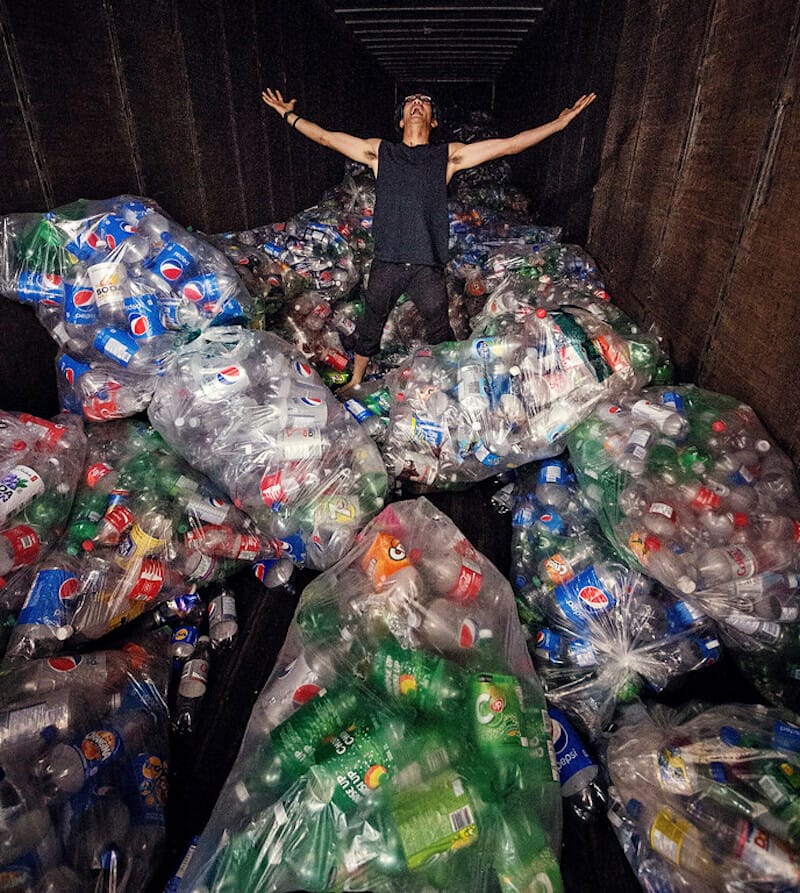Von Wong was referencing his recent work profiled by the new podcast series called People Over Plastic. People Over Plastic (POP) is a BIPOC storytelling collective and podcast working towards an anti-racist and plastic-free future. POP founder Shilpi Chhotray says,
“plastic pollution may have emerged as one of the most critical stories of our time, but we still struggle to connect it back to the other issues we face and acknowledge the voices at the heart of the crisis. In POP, we are taking an intersectional approach by illuminating diverse voices (women, LGBTQ, BIPOC, & people from the global south) — with the ultimate goal of making the conversation more personal and inclusive…”
Chhotray continues, “I've personally seen how Von Wong's fantasy-like artwork has reached the hearts and minds of people all over the world and wanted to hook listeners in through discovery to the frontlines.”
Indeed, after looking at the hundreds of Von Wong images you are exposed to the true reality of plastic pollution. The images show a unique presentation of how plastic pollution is a global issue, seen through the eyes of Von Wong. His art is not just for show, it is there to highlight the importance of an issue that resonates with him so that we can all feel it as he puts it-- “It's the closest thing you can experience to actually being there on site and experiencing what it's like to truly drown in plastic waste.”
Here, Picture this Post (PTP) talks with Benjamin Von Wong (BVW) about his work that you see in these amazing images.
(PTP) What first drew you to devoting your art to fighting global plastics pollution?
(BVW) I was at a period in my career where I desperately wanted my art to do something more than accumulate likes and followers - and I was in a mind-space of looking for different causes my art could help contribute to. I didn't know much about the oceans, but my mom had discovered a mermaid tail designer and I wanted an excuse to collaborate with her.
As with most of my projects, the inception of any project is a fantastic excuse to dive into a different topic. This was around the time that the great pacific garbage patch had just been discovered, so it wasn't hard to find mountains of terrifying facts and statistics to inform the project.
Of course, once you start seeing and paying attention to the terrifying things happening... it's impossible to go back.
(PTP) Do you have any anecdotes of how your work has changed people’s outlook or behavior?
(BV) Being an artist + activist means having a deeply asymmetrical relationship with the audience. It is rare to know how the work has affected others beyond the surface-level comments one might stumble upon on social media, but that doesn't mean that it's not there.
Probably the best anecdote I can share is the story of this entrepreneur that I have never met or spoken with called Huang Ning Ning, all the way in Wuhan China (A place I've never been) who credited me as one of the reasons for quitting her day job and starting an upcycled plastic fashion company. **
The only reason I stumbled across this story was because of a random google alert. How many other stories like that lie out there that I'll never ever know of.
(PTP) Please share with our readers how your creative process unfolds?
(BV) I see art as a communication tool whose goal is to change people's perspectives about a certain situation.
I do not start a project unless I think that art can help contribute to solving a specific problem. That's why the work I do aspires to be highly metaphorical - whether it's collecting over 100,000 straws into a single Guinness record art installation to share how small decisions add up - or creating a piece to point at the upstream problems of plastic production, rather than the downstream repercussions of plastic consumption by building a giant levitating faucet - these are always pieces that try to solve a very specific communication challenge that anyone in the industry can then use and leverage.
Read more on the Von Wong website and the People Over Plastic podcast websites.
Nominate this for The Picture This Post BEST OF 2022???
Click Readers' Choice!
Photos courtesy of Von Wong

About the Author: Jessica Purdy
When Jess asked her friends to describe her, they unanimously said three words: outgoing, funny, and spontaneous. She has a passionate voice for the things she cares about, including politics, animals, lgbtqa+ and women’s rights. Growing up in the suburbs of Manchester, England, Jess has a special place in her heart for British sport. Her ideal Sunday would be spent on the couch watching Manchester United, while eating homemade vegetarian lasagna. Besides that, you’ll find her on a tennis court, whether it be cheering on her teammates during rigorous collegiate competitions or playing herself.












The plastics in the ocean is not a plastics problem, it is mostly a people problem. Plastics CAN BE RESPONSIBLY DISPOSED OF OR RECYCLED. some plastics can immediately be reused, other must be recycled via the longer path, and some plastic items can only be used once, if that many times.(Plastic sacks that stretch and tear are a prime example of that.)
But that same plastic can be mixed wit sand, or pebbles, or crunched clam shells and cast into landscape timbers, or even stepping stones. There is a problem, though because it would work best with equal weights of sand and poly-plastic. But think how many bags to make a pound. So the problem is in the logistics of gathering the materials. Harvesting the plastic in the ocean would be one way to gather enough to be useful, but it seems that the concentration may not be quite as dense as portrayed.
Thanks for your very thoughtful comment– Amy Munice, Editor